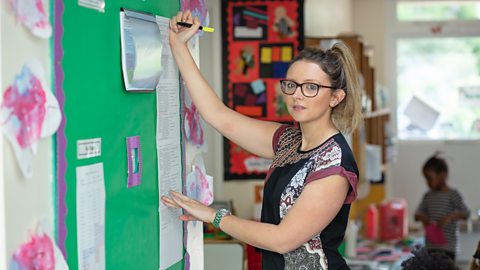Looking up specialist words
Watch the video to find out more.
Interviewer: Claire, can you tell me what you're doing?
Speaker: I'm just checking the ingredients to see if there's any additives because we've got a new child with asthma.
So there's a word on this one, I don't know what it means, 'tartrazine'.
So I do need to look it up and just make sure.
So I'm looking at an online list for children with asthma.
It just gives me the ingredients and the effects it has on children.
I've found a food additive section here that says, 'Sulphates and tartrazine are the most common allergy-triggering additives', which is in the snack, that actually children with asthma can't have.
So I'll make sure that the child we have with asthma, won't be anywhere near the snack.
Finding the right meaning of these words
Test your knowledge with this activity.
Expressing opinions with evidence
Watch the video to find out more.
Interviewer: Claire, where are you going?
Speaker 1: (TO AUDIENCE) I'm just going to speak to Basia.
There was a child this morning that brought a snack into nursery.
I just need to give her all the information and persuade her something needs to be done.
Speaker 1: (TO OTHER PEOPLE) I'm just a bit concerned because the wrapper was open and it could have been shared, and when I checked the ingredients of the snack it contained maltodextrin, which - we've got Jack who's gluten intolerant and he can't have that.
Speaker 2: Do you think it was shared with Jack?
Speaker 1: Quite possibly. So I do feel that we need to write an incident report, and write a letter home to parents.
Speaker 2: Why would you like to do that?
Speaker 1: I just think that we need to make parents more aware of how serious this situation can be.
Speaker 2: I agree to you writing the incident in the log book and with regards to writing the letter, I suggest you speak to the nursery coordinator, Miss Beverly.
Speaker 1: Brilliant, thank you Basia.
Interviewer: Claire, that seemed to go well with your manager. How did you persuade her?
Speaker 1: (TO AUDIENCE) Yeah I know, I do think it went really well.
I managed to speak to Basia and give her the information.
Gave her my opinion, and I have convinced her that something does need to be done.
Find the opinions
Test your knowledge with this activity.
Using complex sentences in writing
Watch the video to find out more.
Speaker: I'm just going to write up the incident log regarding the child that brought in the snack from home.
So I'm using full sentences, and the way that I'm trying to write it is that it tells a story.
So I'm making clear connections between all the stages that have happened.
Interviewer: Can you show me where you're doing that?
Speaker: So, 'As the bar wrapper was opened', comma, 'I could not be sure that the snack had not been shared.'
Interviewer: So what other methods are you using?
Speaker: So I've got the word 'because'.
I need to connect ideas together, so 'because' is a good word to use.
This report could be read by a number of people.
You have the local council, inspectors, teachers, the parents.
So I have to be able to write it in a professional manner.
So using full sentences, and I'll write about what actions need to be done from this.
Turn simple sentences into complex ones
Test your knowledge with this activity.
More on Childcare
Find out more by working through a topic
- count1 of 5
